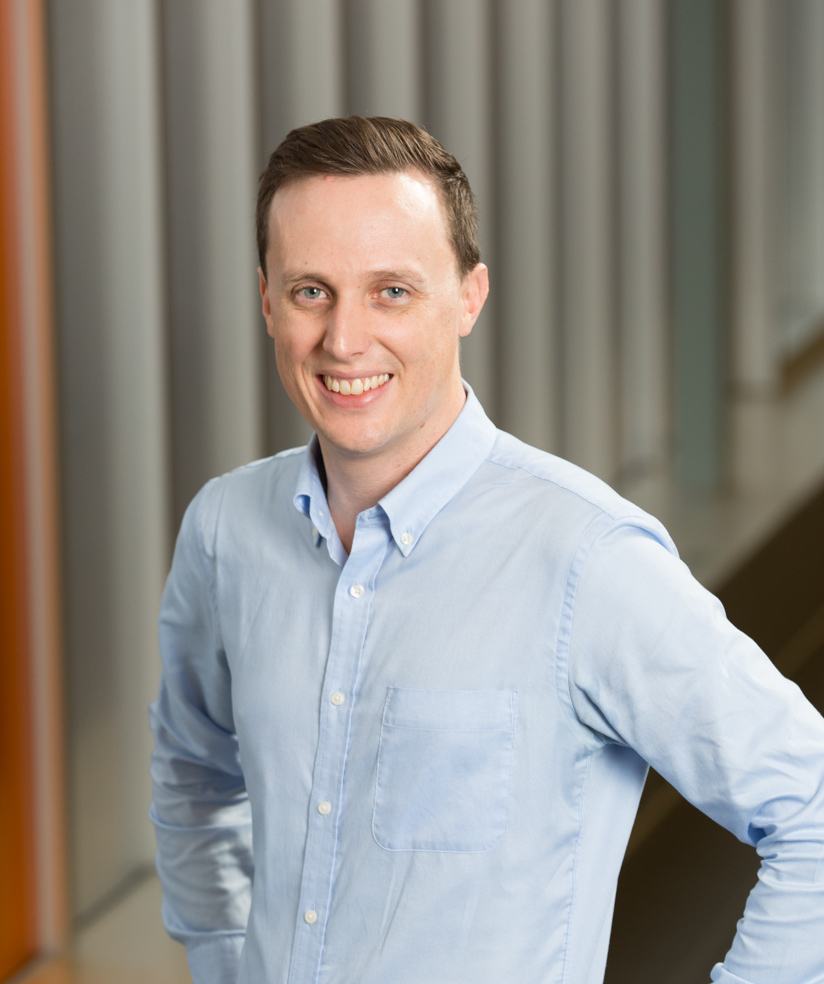
Dr. Galen Wright, new Canada Research Chair in Neurogenomics.
Meet Galen Wright, the new UM Canada Research Chair (CRC) in Neurogenomics.
Galen Wright, the new UM Canada Research Chair (CRC) in Neurogenomics recently joined the UM as an assistant professor, pharmacology and therapeutics, Max Rady College of Medicine, Rady Faculty of Health Sciences, working at the Kleysen Institute for Advanced Medicine (a joint institute of the Health Sciences Centre Foundation and UM). He was awarded a Tier 2 CRC, which comes with $500,000 in funding over five years, from the Natural Sciences and Engineering Research Council of Canada. UM Today caught up with him to learn a bit about him and the research he is undertaking.
Tell us about your research
My research program is focused on using genomics to understand how the brain functions. To enable this, I make use of recent developments in computational biology, human genetics and functional genomics. An area of key focus is the study of the fundamental biology of DNA repair in the brain. DNA encodes the genetic instructions in humans and other organisms and is found in the majority of cells in our body. Due to high energy consumption in the brain, DNA needs to be repaired aggressively to avoid cell death and to ensure the integrity of this information. My CRC investigates how these repair pathways work in the brain. I will focus on the analysis of large genomic data sets from the brain using bioinformatic methods, such as machine learning, to understand how DNA repair pathways are regulated in the brain, and how these pathways enable the brain to continue to function.
Why is this research important to Canadians?
Although the work funded by my CRC is related to the natural sciences, DNA repair pathways have been linked to various human diseases, including those outside of cancer. One example is neurodegenerative disorders, which currently lack effective treatments and are becoming increasingly important with the aging population. Neurogenomics and human genetics therefore provide opportunities to both increase our biological understanding of complex systems and identify novel drug targets.
Tell us a bit about yourself.
I grew up in Cape Town, South Africa and did my graduate training at Stellenbosch University. After my PhD, I received further training at the South African National Bioinformatics Institute, before moving to Vancouver to start a postdoctoral fellowship at the University of British Columbia. I started my current position at UM in April 2020.
Why UM?
UM has placed a significant focus on hiring new faculty with expertise in data science and computational biology and there is a very supportive community of researchers here. My department has extensive and diverse expertise in the field pharmacology and therapeutics, which makes it great for collaborations and allows you to tackle scientific problems in a diverse manner. I will benefit through working closely with neuroscience experts in this synergistic environment, enabling excellence in this research.
What does CRC funding mean to you as a researcher?
This award is extremely timely – I have just started my first independent position and it allows me to efficiently tackle interesting and relevant biological questions. For example, it will allow me to follow up on genes that I have prioritised via computational analyses in the wet lab using neural cell lines. The CRC will therefore lay the platform for me to train the next generation of scientists and contribute towards Canadian society in a positive manner.
How did you feel when you learned you were awarded your Canada Research Chair?
I was extremely excited to be honored by this prestigious award. There are so many talented early career investigators in Canada, so I am humbled to be recognised by this position. Starting a research group during a global pandemic has been challenging, and this is definitely the best research-related news I have received, both during 2020, and throughout my research career.
What inspires you?
Problem solving and being the first to observe and discover a particular finding is extremely rewarding and something that a career in science can provide you with. I am also committed to open and reproducible science and look forward to training the next generation of diverse scientists. I have been fortunate to work with a number of inspiring role models during my research career. My previous postdoctoral supervisor, Dr. Michael Hayden, who is a Tier 1 CRC in Human Genetics and Molecular Medicine at the University of British Columbia, also grew up and was trained in South Africa, before moving to Canada. He has been extremely successful in both academia and the industry, and played a significant role in my recent training. Finally, it is amazing to be able to work and collaborate with my partner and fellow new CRC, Dr. Britt Drögemöller; I am extremely fortunate to be able to share my passion for human genetics and genomics research. We are excited about contributing towards the UM research community!
What about you would people find surprising?
I share my name with, Galen, a Greek physician and philosopher from the Roman empire. He treated both gladiators and emperors during his time in Rome. I enjoy fly fishing and fly tying and look forward to exploring Manitoba further next summer.
Do you have any advice for students/young grad students starting their career?
Explore opportunities to take statistics and computer science courses. Even if biology is your passion, these skills are highly relevant for the majority of research projects. Further, find a supervisor that invests in your training, actively mentors you and wants you to succeed. Graduate training can open doors for you both in academia and in the industry, but this will help you have the most rewarding training experience.
Research at the University of Manitoba is partially supported by funding from the Government of Canada Research Support Fund.






